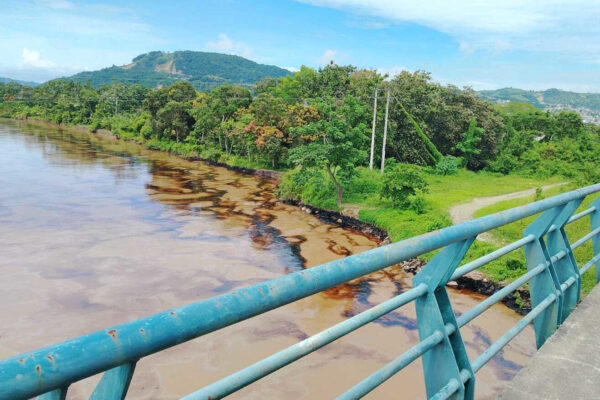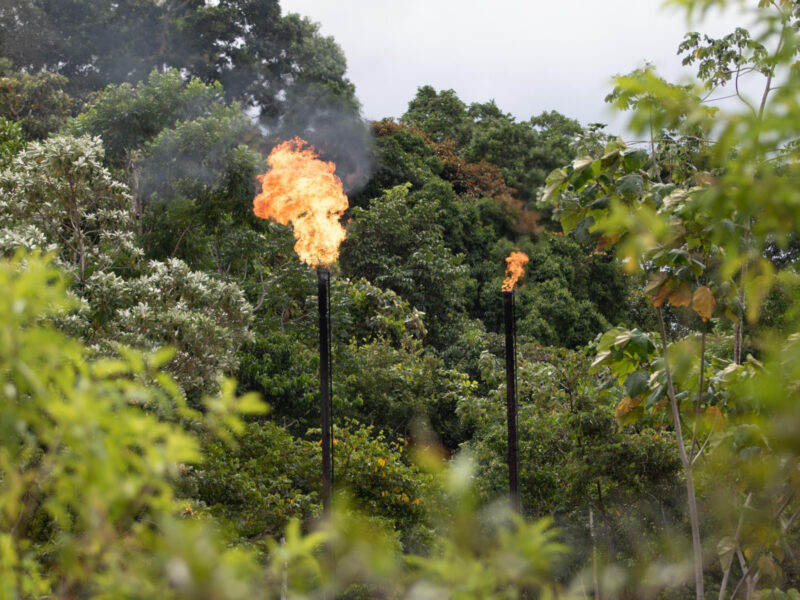Even after many years of working with Indigenous peoples, it is rare to have the opportunity to get to know a completely new culture, with its unique language, stories, and different perspectives on the world. Recently, our trip to the Chapra nation deep in the Peruvian Amazon provided just that. It also allowed us to better understand the significant challenges they face, including the urgent need for official land titles to safeguard their territory from external threats.
The Chapra people have only worked with international organizations like Amazon Watch for less than two years, and they continually surprised us throughout our week-long visit to their territory deep in the Peruvian Amazon. We were deeply impacted by the richness of the forest they protect, their fierce independence, the great food coming out of their territory, and the powerful leadership of their first woman president, Olivia Bisa Tirko.
Amazon Watch was honored to participate in the Third Shaniishinshi of the Chapra Nation. No other organization had ever attended an assembly like this one before. The trip provided us with an opportunity to share the results of the recent delegation to the U.S., where Olivia confronted executives of banks financing threats to the Chapra territory, led by state oil company Petroperú. Additionally, the visit helped us strengthen our alliance with the Chapra and gain a deeper understanding of their plans, challenges, and strategies.

The Chapra territory is located very deep in the heart of the Peruvian rainforest. Getting there, even today, takes a lot of time and effort: first a 90-minute flight from Lima to Tarapoto, then a three-hour car ride to Yurimaguas, another 60-minute flight in a small single-engine plane to San Lorenzo, followed by a ten-hour boat trip over the Marañon and Morona rivers to the Unanchay community, which was chosen to hold the Assembly this year.
When we arrive late at night, we are immediately invited to the closest house and served Chapra-style chicken soup. The Shaniishinshi starts very early the next morning, so after dinner we head to the community’s school, set up our tents, and have no trouble falling asleep soundly.
Changes and continuity in Chapra culture
As president, Olivia makes this onerous trip once or twice a month to attend to the needs and struggles of the Chapra communities. This includes essential duties like ensuring that the schools have teachers, there’s a minimum of medicine available at the few community health centers, and verifying that the Peruvian government’s social programs are delivered adequately to qualifying families.
But she doesn’t only attend to the basic services of the Chapra families on these constant trips. Olivia is also engaged in activism to represent and gain support for the legal recognition of Chapra territory and autonomy. Even more impressive: Olivia is also a mother of two children, and she studies law at the same time.
The Chapra have never been colonized, and they have a reputation for being fearsome warriors. Historically, they have fiercely guarded their independence, even from neighboring Indigenous nations, such as the Achuar and Wampis with whom we also work closely. In recent years, the Chapra have focused their efforts on consolidating their autonomous territorial government and halting exploration and extraction in oil Block 64.
The first federations of Chapra communities were formed to represent their demands to the Peruvian government, which had only just been restored to civilian rule. Three years ago, the Chapra decided to change their organizational structure, joining a movement among Indigenous nations to exercise their right to independently govern their ancestral territories and seek recognition as nations within Peru.
The assembly: a place to care for the unity and future of the Chapra Nation
The assembly is the main planning and decision-making body of the Chapra Nation. Every community member has the right to speak at the assembly, but to cast a vote you must be an elected Kuraka (“President”) of one of the 33 Chapra communities. The decisions made at the Assembly have to be approved by consensus and are binding for the whole nation. At the same time, it is a space for clarification, resolution, and healing of internal disagreements.
As guests, we were able to listen to the debate and take note of the questions and requests for information. This preparation helped us to be ready when it was our turn to address the assembly to explain our involvement and support. By participating, we ensured that we gained direct knowledge of the communities’ positions and priorities. Additionally, our presence supported the accountability and transparency of the democratically-elected leaders we work with, thus strengthening the organizational base of all the campaigns in which we accompany our partners.

This was Olivia’s second Shaniishinshi as President, and the agenda included addressing internal tensions that had arisen questioning her leadership and utility of her recent international trips. This is not surprising, as It was the first time for a Chapra leader – and notably a Chapra woman – had a passport and traveled abroad to attend events like the COP in Dubai, Climate Week and the United Nations Permanent Forum for Indigenous Issues in New York City, or the Annual General Meeting season of major international banks, as she did during our delegation to New York and Washington, DC.
Olivia stated in the assembly: “It is extremely important that we all understand our statutes, through which we formed our Autonomous Territorial Government. This is like our constitution, our law, as the Chapra Nation. It establishes how we make decisions, how we choose our authorities, and how we organize. As president, it is my job to protect our statutes and to implement the decisions of the assembly.”
All participants had an opportunity to speak, and Olivia patiently answered their questions and comments. Throughout the assembly, it became clear that all leaders valued their unity, and they insisted on the need to dispel rumors and clarify any misunderstandings. We also saw how highly community leaders valued Olivia´s expertise, clarity, and decisiveness. After these discussions, her leadership was ratified unanimously and leaders insisted on the continued mandate to defend Chapra territory.

As the first day concluded we used the last light of the day to bathe in the river and prepare for dinner. During the meal, we were able to have a more informal conversation with the Kurakas, who shared the devastating effects of oil spills that had ravaged their territories.
Land titling and external threats
On day two, the accountability session of the assembly was concluded and the Kurakas expressed their full support for Olivia´s presidency until 2026, when a new president must be elected, as immediate reelections are forbidden. This marked a time to discuss the nation’s problems and propose solutions.
Only four out of 33 Chapra communities have official land titles, which not only grants legal recognition to their ancestral lands, but also facilitates access to healthcare, education, and other Peruvian government services. The lack of official land titles can also fuel new border conflicts with the neighboring Achuar, Wampis, and Kandoshi peoples, or even between different Chapra communities.
There is a shared fear that the lack of land titling will fuel land invasions. Some communities have been corrupted by the bribes and false promises of oil companies, which take advantage of the willingness of the local authorities to grant legal land recognition to those who agree to support the exploitation of Block 64.
The assembly asked Olvia to lead a mediation effort with the leaders of the other Indigenous nations to avoid tensions escalating and encourage alliances. Olivia and her governing council are charged with protecting the land from oil-related conflicts and settlers. They must also continue the process to demand land titling and keep working on international alliances to prevent further investments in Block 64.
As Amazon Watch, we also have a responsibility to be transparent in our relationship with the Chapra nation and respond to any questions or concerns that they may have. Throughout the last two years, we have provided legal and communications advice, supported national and international travel, facilitated access to Peruvian and international media, all within the context of the Petroperú campaign. During the assembly, we shared a mini-documentary we co created with Rainforest Action Network on the campaign and an educational video clarifying our finance campaign strategy. Chapra leaders affirmed that they oppose consideration of any proposals from Petroperú.

Next we opened up the meeting for questions as an international campaign to influence investment banks can feel very abstract to community members living deep in the Amazon rainforest. Olivia emphasized the importance of international allies, and we restated our commitment to continue supporting the Chapra nation. To confirm our alliance, community chiefs saluted us and presented us with a symbolic gift of Chapra crafts.
The journey home: reflections and a lot of work ahead
The usual dancing and sharing of the traditional massato drink marked the end of the three-day assembly. The Kurakas and other participants said goodbye for now, and they set off on their long journeys back home, some of which take days.
We also set out on our two-day route, with the agreements of the assembly foremost in our minds. Already, sitting in the boat as we traveled down the Marañon and Morona rivers, we started talking with Olivia about the next steps of our work with the Chapra people.
We stopped in a community on our way back, to have a tasty lunch next to a small lake that was under threat due to the oil spill. Here we can still eat different types of traditional food, and community leaders shared with us the need for a school, land titling of their community, and urgent attention to a plague of mosquitoes. We realized that Olivia and her council need to deal with the challenges facing every community, while at the same time defending the interests of the entire Chapra Nation against powerful outside forces.
Our admiration for the Chapra people and commitment to supporting their cause has grown exponentially throughout these days!














